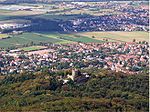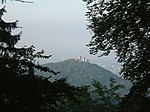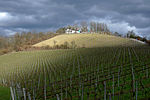Nibelungensteig
Hiking trails in Baden-WürttembergHiking trails in BavariaHiking trails in Hesse

The Nibelungensteig is a hiking trail in the German states of Hesse, Bavaria and Baden-Württemberg. It traverses the Odenwald, a hill range or Mittelgebirge located between the rivers Rhine and Main. The trail starts in Zwingenberg (Bergstraße) and ends in Freudenberg (Main). It is 130 kilometers long, and features elevation changes totaling 4,000 meters. The Nibelungensteig mostly follows natural paths. It is named for the legendary Nibelungen.
Excerpt from the Wikipedia article Nibelungensteig (License: CC BY-SA 3.0, Authors, Images).Nibelungensteig
Bahnhofstraße, Zwingenberg
Geographical coordinates (GPS) Address Nearby Places Show on map
Geographical coordinates (GPS)
| Latitude | Longitude |
|---|---|
| N 49.72586 ° | E 8.60955 ° |
Address
Bahnhofsempfangsgebäude
Bahnhofstraße 25
64673 Zwingenberg
Hesse, Germany
Open on Google Maps










